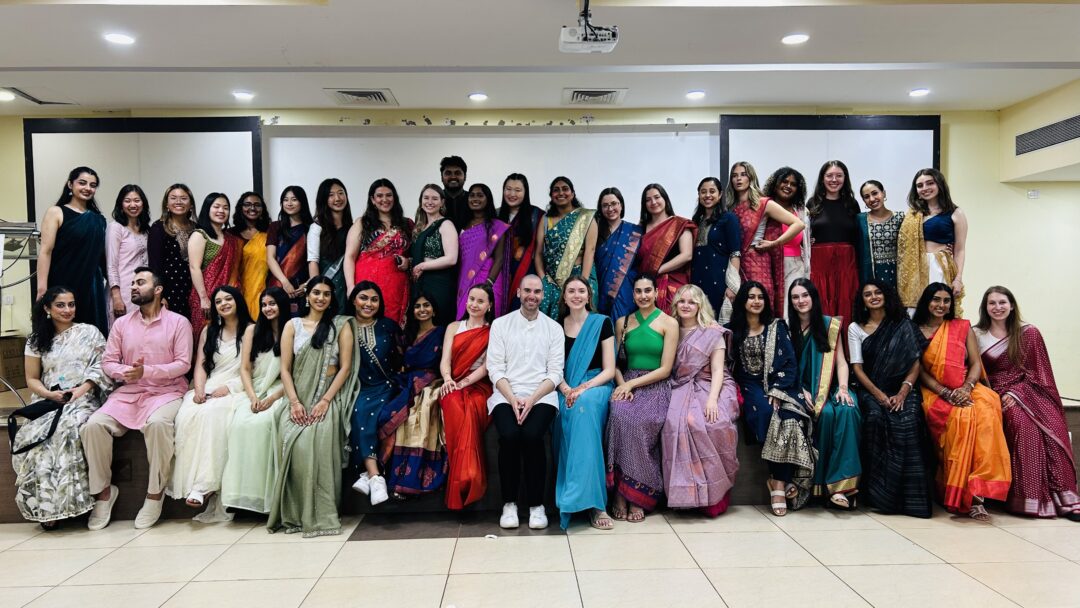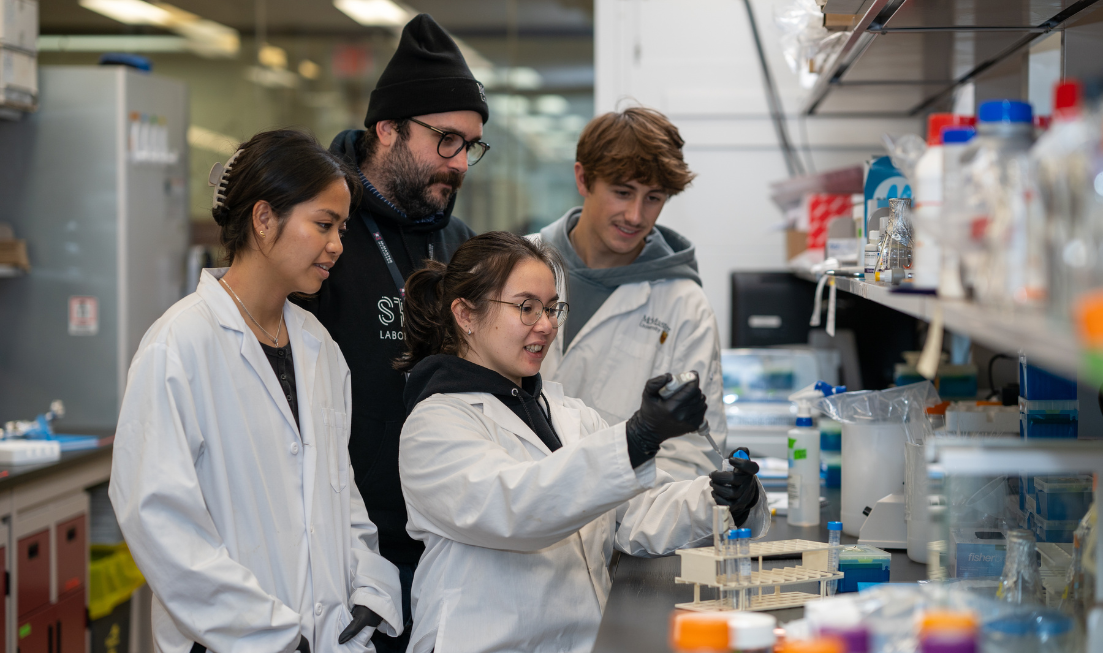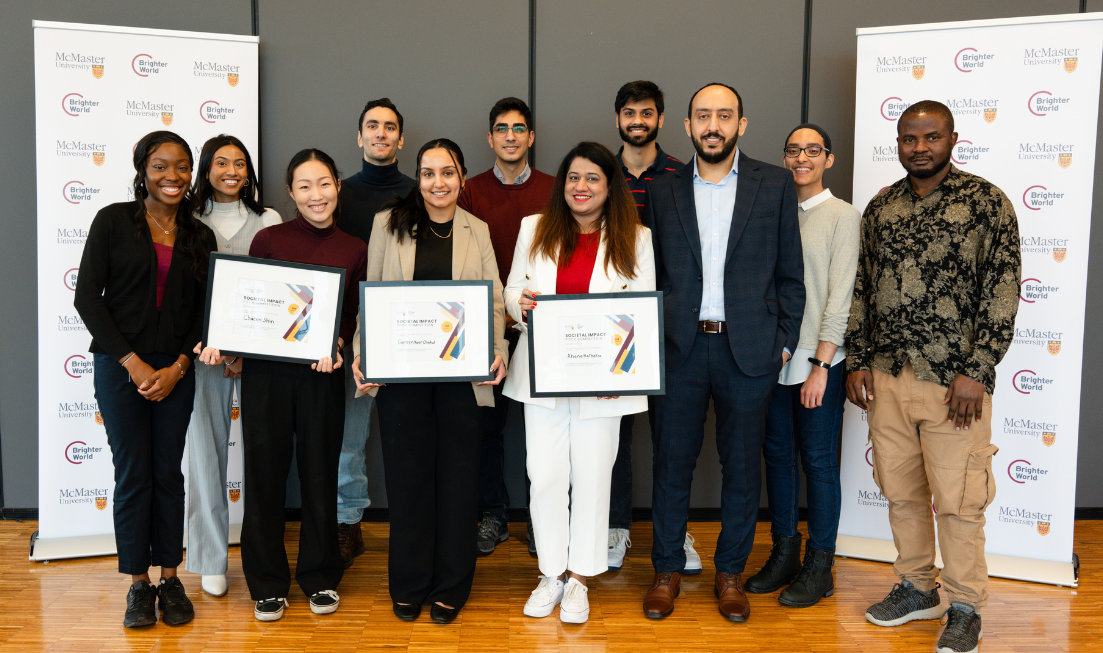A Glimpse into the 2024 Global Learning Symposium: An Experience of a Lifetime in Manipal, India

The Blog Post below is written by Global Health MSc students Sydney Raduy & Mahek Nair.
During the period of April 20th to May 4th, over 270 students, faculty, and expert health leaders from around the world came together to attend the “2024 Global Health Symposium: Bridging Different Worlds”. This international symposium was generously hosted by the Manipal Academy of Higher Education (MAHE) and led by the Prasanna School of Public Health, located in Manipal, India. The core purpose behind such a large-scale transcontinental symposium, was to bring together students and faculty from all partner institutions affiliated within the global health consistorium as means to consolidate cross-border collaboration and decision making within diverse teams. Representatives and students from partner institutions included those from the Netherlands, United States, Bangladesh, Norway, Thailand, Japan, India, and Sudan.
The heart of the symposium’s mission was the development of a systems map designed by teams of students. The main objective of the systems mapping exercise was to gain insights into the complexities of system functioning, essential for addressing global health challenges through a systems-oriented approach. In groups, students were tasked with narrowing down cluster topics to focus on one aspect of the Indian healthcare system and its challenges and strengths, in order to shape universal understandings of global health. To collect information for the systems map, there were organized field visits and expert stakeholder discussions, where the groups prepared questions and took observation notes at the facilities/community sites. For example, in the Traditional Health Practices cluster, we (Mahek’s group) visited a series of Ayurvedic hospitals and traditional health clinics, where we were exposed to the pluralist healthcare system in India. Within these field visits, we witnessed the integrations of traditional practices such as oil baths, medicinal plant nutrition, Ayurvedic massages, yoga and meditation, and homeopathy into a publicly funded healthcare system. In this way, we were exposed to different forms of knowledge acquisition, evidence-based health practices, and perceptions of “modern” Allopathic medicine.
Another central component to the symposium was the weekend conference, held first weekend in India. The conference featured students’ presentations on a wide array of global health research topics, including climate health, neglected tropical diseases, and maternal health support. The inauguration, marked by a traditional Indian prayer and pooja ceremony, set a tone of blessings and success for the students’ presentations. The atmosphere was meant to promote a comfortable environment for raising questions and engaging in discussions. Students were encouraged to attend presentations that piqued their interest, participate in dialogues between presenters and the audience, and offer constructive feedback. For instance, I (Mahek) attended a presentation by a Maastricht University student who coincidentally was analyzing a policy I had previously worked on during my elective class last semester. He mentioned his limited experience with policy analysis and uncertainty about which themes to focus on. This conference created an excellent opportunity for me to share my insights and lessons learned from my own work on the policy.
From another standpoint, I (Sydney) was also able to utilize this opportunity to engagewith interdisciplinary faculty members and other experts to incorporate critical feedback that was given post-presentation. Intaking alternative perspectives from those with similar and or relevant experience from multifarious backgrounds was an invaluable experience that enabled me to strategically evaluate my research goals in a different light. In this way, many students benefited from practical tips on advancing their research, and reciprocally, shared their expertise with others, promoting a collaborative and supportive learning environment.
Combined with the student presentations, the conference also encompassed an array of exceptional plenary speakers. One of the speakers, Kalyani Subramanya, CEO of the Maitrayana Charity Foundation based in India, delivered a touching and eye-opening presentation on her organization focused on building a gender equal society where girls and women can exercise their rights. Her fascinating speech discussed leveraging the power of sports to generate an ecosystem that empowers girls and women to fulfill their potential- to change the way we as society empower women. Ms. Subramanya was only just one out of the many extraordinary speakers that presented from the weekend conference!
Beyond the academic work and intensive field visits, there were many amazing highlights that gave students the opportunity to engage with local students and communities. For starters, the opening ceremony was an iconic and enchanting first night. With a full moon shining over the stage, MAHE students performed mesmerizing traditional dances and songs that showcased the diversity of Indian culture. The event began with a group of Bharatnatyam dancers, which resonated deeply with me (Mahek) as it reminded me of my own experiences as a Bharatnatyam dancer when I was young. This moment where I could reconnect with my culture and share it with my Canadian friends, was incredibly exciting!
Additionally, throughout the weeks, several optional workshops were organized that allowed students to immerse themselves into learning more about India’s culture. Such activities included an Indian cooking class hosted by lead faculty members, Henna hand art sessions run by MAHE students, cultural dance lessons taught by local performers, yoga classes by community members, and evening trips as a group to local beaches to catch the sunsets.
Towards the end of the symposium, students enjoyed a traditional banana leaf dinner, dressed in vibrant sarees and lenghas, beautifully draped by the hostel aunties and our MAHE friends!
Perhaps one of the most special moments from the entire symposium can be alluded to the closing ceremony. It was an emotional night celebrating various cultures and reminiscing on the past weeks’ shared experiences as a group. The evening consisted of spectacular performances ranging from Canadians learning Bollywood dances to students from Thammasat performing a heartfelt Coldplay song. These experiences cultivated strong connections and facilitated a rich exchange of cultural understanding and appreciation among all participants. The closing ceremony was a chance for all students and faculty to collectively reflect and look back on not only the incredible work that had been accomplished, but the connections that were made between one another.
Within such a short amount of time many students created the strongest of friendships and gained newfound understandings of what it means to truly work together in such diverse conditions and environments. In this light, the 2024 Global Health Symposium hosted by MAHE not only bridged different worlds together, but fostered bonds and created memories that will forever be cherished.
Global Health News, Student BlogRelated News
News Listing

Daily News ➚
McMaster earns top spot for graduate student research intensity in annual rankings
Global Health News
December 9, 2024

December 4, 2024

